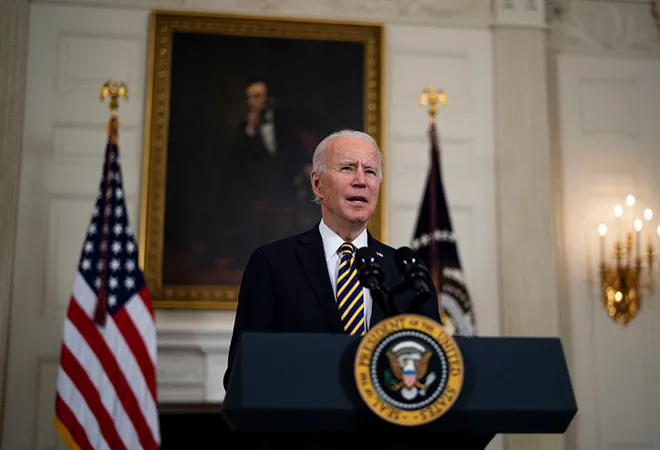-
CENTRES
Progammes & Centres
Location
U.S. President Joe Biden should recognize that countries elsewhere need to be key allies in the fight.

Is democracy for everyone? Are concerns about elections and human rights a luxury that only rich Western nations can afford? Some leaders — notably those of the People’s Republic of China — have long railed against the notion of “universal values,” which they see as an attack their right to rule. (Which, of course, it is.) One would suppose that any U.S. president, especially one as focused on rolling back the tide of autocracy as Joe Biden is, would retort that core liberal democratic principles are not just America’s values, but the world’s.
Yet Biden’s answer in a recent CNN townhall muddled that message. Speaking about a phone call with Chinese President Xi Jinping, Biden first attempted to explain Xi’s own worldview: “If you know anything about Chinese history, it has always been the time China when has been victimized by the outer world is when they haven’t been unified at home,” he said. “To vastly overstate it, the central principle of Xi Jinping is that there must be a united, tightly controlled China. And he uses his rationale for the things he does based on that.”
Biden then described Xi’s response to U.S. criticism of China’s treatment of its Uighur minority and Hong Kong, saying, “By the
Biden was trying to say that American presidents are expected to speak out about human rights — that’s their cultural norm — and Xi respected that. I don’t read this as Biden defending China’s behavior, as some critics have.
But the U.S. president’s words leave a sour taste anyway. No democratic leader should say that there are different “cultural norms” for governance in China than there are anywhere else. You don’t have to be a Cold Warrior to believe that liberal democracy is a better system for everyone. Once you start talking about varying norms, you are effectively agreeing that authoritarian countries have legitimate, cultural reasons to reject democracy. Or that “Asian values” exist.
Moreover, Biden would be wise not simply to accept Xi’s linking of domestic divisions to “victimization” by the outside world. While that may increasingly be the myth around which the Chinese Communist Party’s nation-building project revolves, a realistic foreign policy doesn’t accept other countries’ mythologies as given. Just as the rest of the world isn’t required to take America’s foundational myths seriously just because Americans do, the U.S. president should be more skeptical of Beijing’s abuse of history for its own purposes.
There’s a more insidious corollary to Biden’s rhetoric about democracy, too. At the Munich Security Conference last week, his speech on the importance of transatlantic relations implied that the defense of democracy was at its core a Western mission. The democracies of the Indo-Pacific were mentioned but only in terms of defending the “global system” that Europe and the U.S. had built over 70 years. That’s not quite the same thing.
While Biden is smart to try to build a coalition against authoritarianism, one that is centered on the old Euro-American axis will fail. The idea sounds particularly odd during a pandemic which Asian democracies — from South Korea to Taiwan to, yes, India — have done a better job managing than their Western counterparts. Arguably, democratic dynamism — and efficient, healthy elections — are more visible on the other side of the world.
The fact is that defending democracy requires us to evangelize it, to hope that its bounds are set wider with every passing decade. That requires as many champions as possible, all equally invested in the project and able to spread the message in their own idiom.
And it requires rejecting the idea that there might be different standards for different countries or parts of the world. That would imply that authoritarian countries will be authoritarian forever.
The embattled democracies of the West — and, yes, of Asia and Africa — aren’t going to be enthused by a philosophy that suggests powerful autocracies are destined not just to survive but to grow ever more powerful. Especially where non-Western democrats feel threatened by their own countries’ institutional decay or populist backsliding, those citizens need to believe that the U.S. president believes in their struggle. They deserve nothing less from the leader of the free world.
This commentary originally appeared in Bloomberg.
The views expressed above belong to the author(s). ORF research and analyses now available on Telegram! Click here to access our curated content — blogs, longforms and interviews.

Mihir Swarup Sharma is the Director Centre for Economy and Growth Programme at the Observer Research Foundation. He was trained as an economist and political scientist ...
Read More +